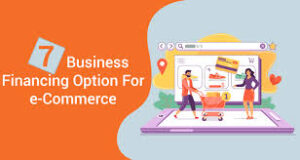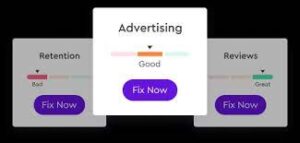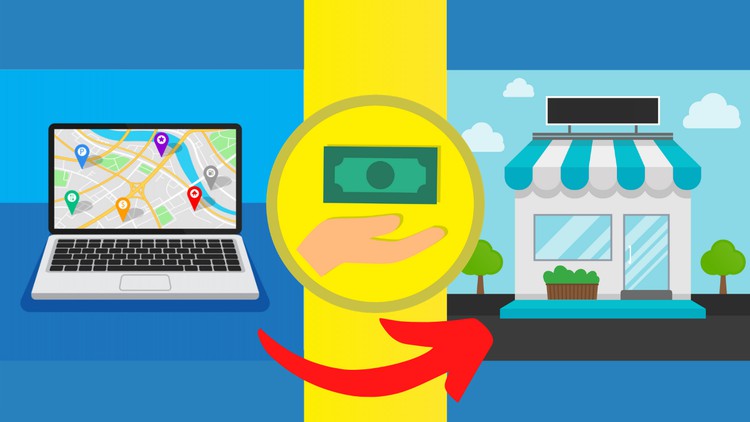6 Best Funding for Ecommerce Business Loans:

Funding for ecommerce business loans offers online retailers the necessary capital to initiate or expand their business. Various sources, such as banks, angel investors, government grants, and crowdfunding platforms, provide funds for e-commerce ventures.
If you’re at the beginning stages of establishing an e-commerce business or aiming to make it bigger, an ecommerce business loans can be beneficial in covering various expenses. These expenses encompass dropshipping, reselling products, manufacturing goods from raw materials, employing staff, promoting your business, and covering daily operational costs. Established e-commerce enterprises frequently require funding to facilitate their growth or expansion.
What is an eCommerce Loan?
Ecommerce business loans provide financial assistance for the various expenses associated with operating an ecommerce business. Similar to other business loans, this type of financing allows you to borrow capital and repay it within a specified timeframe. Unlike equity financing, you typically don’t have to relinquish ownership of your business, but you may be required to pledge personal or business assets as collateral. The length of the repayment period varies based on the loan type and lender, so it’s essential to select a repayment plan that suits your business’s needs.

How ecommerce business loans work
In many cases, a solid credit score is necessary to qualify for most ecommerce loans. However, if your credit score is not strong, lenders may request collateral in the form of personal or business assets to secure the loan. Repayment of the loan is typically done through automatic monthly payments, although some lenders may require daily or weekly repayment schedules. Timely repayment can potentially improve your credit score, increasing your chances of obtaining larger financing in the future.
You can use most ecommerce business loans to:
- Cover various marketing expenses such as advertising and influencer campaigns
- Upgrade your website
- Pay for operational expenses like payroll, shipping, or software
- Stay on top of processing and platform fees
- Purchase inventory
- Grow your team!
Do You Need An Ecommerce Business Loan?
It’s important to have a clear understanding of your funding needs and a well-defined plan for how you intend to use the funds before pursuing any ecommerce funding option, including ecommerce loans.
There are many ways to use your ecommerce business loan:
- Enhance your online visibility, such as by improving your website
- Allocate funds towards software, equipment, payroll, or shipping needs
- Monitor and manage processing and platform fees
- Invest in inventory or stock for your ecommerce business
- Expand your workforce by hiring additional staff members
Choosing the Right eCommerce Business Loans
If you have a good credit score and require funding for various business expenses, a fixed-term loan or Small Business Administration (SBA) loan could be suitable ecommerce loan options. Conversely, if you need quick access to capital, you may consider revenue-based financing, a line of credit, or business credit cards.
When applying for an ecommerce loan, it is important to prepare your credit score, financial accounts, and any assets that can be used as collateral if required. A well-planned approach often combines different types of ecommerce business loans.
It’s crucial to thoroughly research each ecommerce loan option, as they have varying repayment structures, interest rates, and financial covenants. Understanding the terms and conditions before signing any agreement is essential.
When seeking funding for your ecommerce business, there are several options you can explore:
- Small Business Loans: Traditional lenders, such as banks or credit unions, may offer small business loans that can be used for ecommerce purposes. These loans typically require a solid business plan, financial documentation, and collateral.
- Online Lenders: Online lenders specialize in providing loans to small businesses, including ecommerce ventures. They often have streamlined application processes and faster approval times compared to traditional lenders.
- Peer-to-Peer Lending: Peer-to-peer lending platforms connect borrowers with individual investors. These platforms can be an alternative to traditional lenders, offering competitive rates and flexible terms.
- Business Credit Cards: If you need short-term financing, business credit cards can be a convenient option. They provide a revolving line of credit that you can use for various business expenses, including inventory purchases or marketing campaigns.
- Crowdfunding: Crowdfunding platforms allow you to raise funds from a large number of individuals who believe in your business idea or product. This can be an effective way to generate capital for growth and expansion.
6 Best Ecommerce Business Loans

It’s important to note that there are numerous ecommerce loan options available, ensuring that you can find one that suits your specific needs. Now, let’s explore some of the top choices for ecommerce loans.
1. Myos
Myos provides asset-based working capital finance with favorable conditions. The advantage is that you don’t need to offer a personal guarantee, eliminating financial risk for you.
To be eligible for Myos asset-based working capital finance, the following criteria generally apply:
- Registered office in Germany, Austria, Estonia, Cyprus, or the United Kingdom.
- Minimum operational period of 6 months.
- Minimum online selling period of 50 days (e.g., on platforms like Amazon, eBay, or your own online shop).
- Products with a shelf life of at least one year.
However, it’s important to note that there can be situations where the funds you invest in manufacturing may not immediately translate into profits for your business. This loan option is suitable for ecommerce, SaaS, small, and medium businesses.
- Location: Europe, UK
- Loan amount: €10.000-2.500.000
- Type of financing: Revenue-based
2. Capify
Capify’s business loan is an excellent funding option for your business. They offer loans with flexible terms, including short, medium, or long durations.
Short-term loans typically have a duration of 6 months, medium-term loans last around 18 months, and long-term loans span 3 to 5 years.
To qualify for an ecommerce loan from Capify, you need to meet their specific criteria. Unfortunately, the specific criteria are not provided here.
- Have a trading history of at least 12 months
- Have a minimum monthly revenue of £10,000
- Location: Europe, UK
- Loan amount: £5,000 – £500,000
- Type of financing: Small business loan, merchant cash advance
3. Lemonero
Lemonero provides a revenue-based payment model tailored to small and medium-sized merchants, offering funding of up to 80% of the merchants’ applications. Additionally, Lemonero offers data insights that assist in forecasting cash flow and monitoring financial status.
Ideal for: Ecommerce businesses, online marketplaces, and payment service providers seeking funding for inventory purchases or marketing investments.
- Location: Europe
- Loan amount: €1.000 to €500.000
- Type of financing: Revenue-based, embedded lending
4. Payability
Payability’s concept is built on the understanding that it can take weeks or months for vendors to receive payments from ecommerce platforms. To address this, Payability offers various options for loans to help with payables, purchasing goods, and pursuing expansion opportunities.
1. Quick Access
To be eligible for Quick Access from Payability, you should have a minimum of $10,000 in monthly sales and a selling experience of at least 3 months. Payability charges a 2% commission on gross sales.
2. Immediate Advance
To qualify for Immediate Advance with Payability, you need to have an average monthly sales volume of at least $50,000 and a sales history of 9 months. Payability typically charges a weekly fee ranging from 0.5% to 1% of your sales.
3. Advance Line
To be eligible for Advance Line from Payability, your annual sales volume should be at least $500,000. Repayment of Advance Line is based on a fixed percentage of sales, rather than a fixed rate on the available amount.
Best for: Ecommerce businesses on Amazon, Shopify, Walmart, or Newegg.
- Location: USA
- Loan amount: Funding amounts are based on your monthly e-commerce revenue.
- Type of financing: Asset-based and merchant cash
5. Uncapped
Uncapped provides business loans ranging from €10,000 to €10 million, specifically designed for expanding ecommerce businesses. Repayment options include fixed monthly payments over 3-24 months, or payment based on a percentage of your monthly sales (between 5-25%) until the principal and fees are fully repaid.
There is no minimum credit score requirement, but you should have a minimum of 6 months of operational history and generate monthly revenues of €100,000 or more to qualify for an Uncapped loan.
Ideal for: Ecommerce, SaaS, direct-to-consumer, gaming, and app development industries. Please note that sole traders are not eligible for this loan option.
- Location: Europe
- Loan amount: €10,000-€10 million
- Type of financing: Revenue-based financing
6. LendingCrowd
LendingCrowd offers e-commerce business loans that can support your expansion plans and facilitate the growth of your business. Regardless of the specific strategy for expanding your business, having the right loan can enable you to seize new opportunities and turn your ambitions into reality. With fixed monthly repayments and loan terms ranging from 6 months to 5 years, you can effectively plan your cash flow and maximize your growth potential.
LendingCrowd offers borrowing options from £75,000 to £500,000, with loan terms ranging from six months to five years. Their flexible platform allows regular or one-off overpayments and early repayment in full, without any early repayment charges.
7. Lendzi – Best for Businesses With High Revenue
If you’ve faced loan rejections in the past for your ecommerce business loans, don’t be discouraged from considering Lendzi as an option. Lendzi, established in 2020, specifically caters to borrowers with substantial revenue who have been turned down for business loans elsewhere. They function as a direct lender and also collaborate with over 75 other lenders, enhancing your chances of qualifying for a loan.
In addition to credit, Lendzi provides six other types of small business loans, which include equipment financing, merchant cash advances, short- and long-term loans, business lines of credit, and SBA loans. The application process is quick and can be completed online within a few minutes. Once you submit your application, a representative will contact you. To be eligible, your business should have a minimum history of six months and an annual revenue of $180,000 or more.
Lendzi offers working capital loans ranging from three to 15 months, with amounts of up to $400,000. These loans have factor rates starting at a low of 1.15. What sets them apart is that they have a lenient credit score requirement of just 500. This makes them particularly suitable loans for ecommerce businesses that have faced loan rejections in the past due to poor credit.
Cubefunder and Online eCommerce Business Loans

At Cubefunder, they strive to make the process of applying for a business loan for online businesses as simple and accessible as possible. Cubefunder understands the importance of providing you with the necessary support and flexibility to help your online venture progress and thrive.
1. Amazon Sellers
An Amazon business loan can provide funding to online businesses, enabling them to purchase additional inventory for resale or acquire storage facilities to accommodate larger product volumes.
2. eBay Sellers
Cubefunder offers eBay seller business loans that provide the necessary funds for your business over a repayment period of up to 12 months. This financial support ensures stability and security, allowing you to focus on growing your online business.
Cubefunder offers a specialized Google Shopping loan designed to support the expansion of your online business. Whether you experience a surge in demand or require additional funds to purchase goods from suppliers, our loans are tailored to provide the necessary financial assistance to meet your business needs.
4. Shopify Sellers
Cubefunder offers Shopify business loans that provide the necessary funding for your business over a repayment period of up to 12 months. This financial support ensures stability and security, allowing you to focus on growing your online business on the Shopify platform.
Small Business Loan for Ecommerce
The Small Business Administration (SBA) provides valuable information on different ecommerce business loans programs and eligibility criteria. A small business loan tailored for e-commerce can be transformative for your online business, offering the financial assistance required to drive growth, improve your online presence, and stay competitive. By following the aforementioned tips and utilizing external resources, you will be well-prepared to make informed decisions and obtain the funding necessary for your e-commerce success.
- SCORE, a nonprofit organization, offers free mentoring and resources to small business owners, including assistance in securing loans.
- For those using Shopify as their e-commerce platform, Shopify Capital provides financing options specifically designed for online businesses.
- Kiva is a microlending platform that connects entrepreneurs with lenders who are willing to provide small loans to support business growth.
- The Small Business Administration (SBA) offers valuable information on different loan programs and eligibility requirements.
- 6 Basics of How to Scale Your Ecommerce Business the Right Way
- What are the Risks of Selling Electronic D2C Products: D2C Ecommerce
- 5 Best Tips to Choose Ecommerce Business Name Ideas
- What is Ecommerce Business Intelligence: 5 Top Tools for BI
- Print-on-Demand Shoes Ecommerce Business: A Step-by-Step Guide
- eCommerce Affiliate Network | 10 Affiliate Platform





